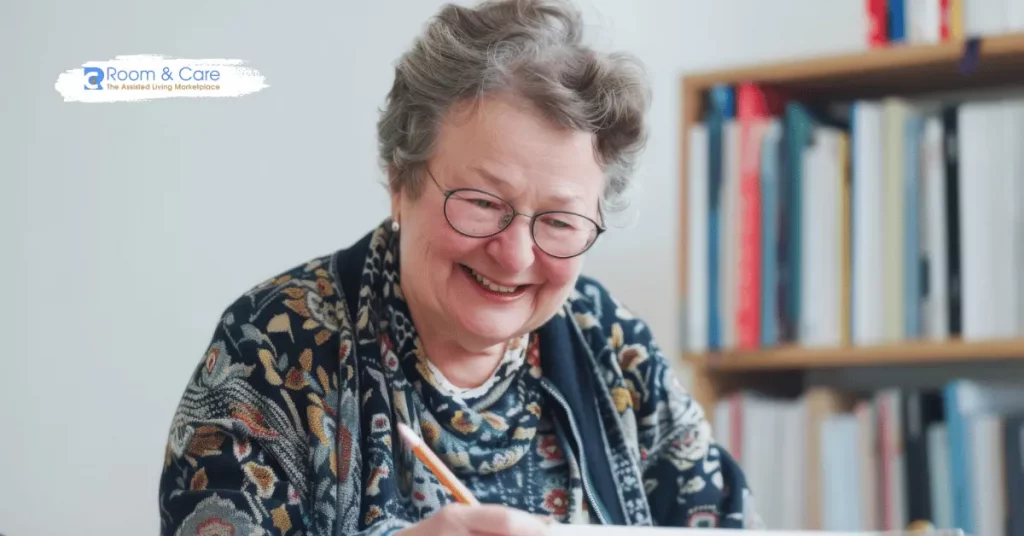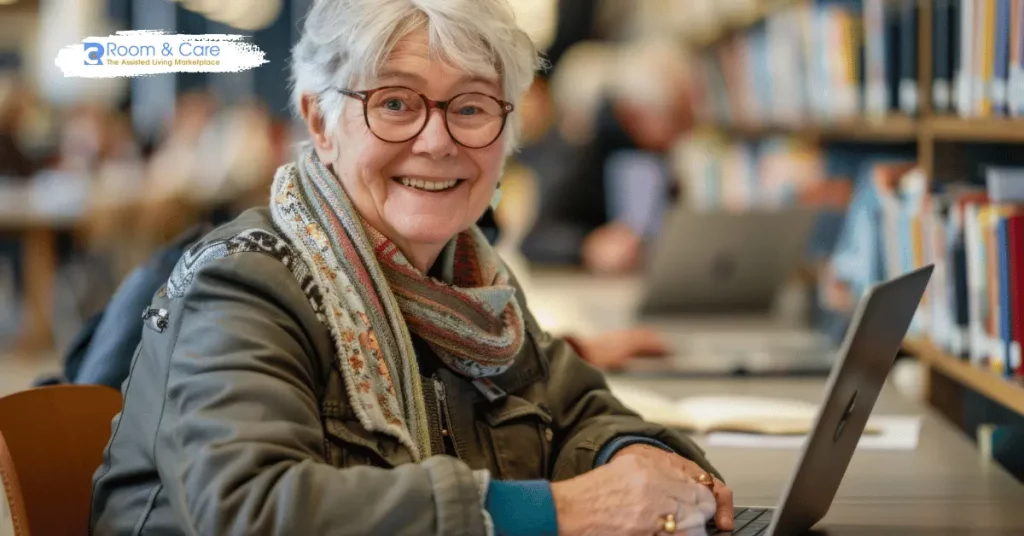

The quest for knowledge and personal growth doesn’t have to wane. In fact, lifelong learning for seniors can be a vital component of maintaining mental acuity, emotional well-being, and overall quality of life. This blog post will delve into the significance of lifelong learning for seniors, particularly in the context of assisted living homes, providing practical advice, tips, and insights on how to foster a learning-friendly environment in these settings.
Lifelong learning offers numerous benefits for seniors, including:
Cognitive Health: Engaging in learning activities helps keep the brain active and can delay the onset of cognitive decline. Studies have shown that continuous learning can reduce the risk of dementia and Alzheimer’s disease.
Emotional Well-Being: Learning new skills or hobbies can boost self-esteem and provide a sense of accomplishment. It also helps combat feelings of loneliness and depression.
Social Engagement: Educational activities often involve group interactions, fostering social connections and reducing isolation.
Physical Health: Some learning activities, such as dance or gardening classes, also provide physical exercise, contributing to overall health and mobility.
Assisted living homes provide a structured and supportive environment that can facilitate lifelong learning. These facilities often offer various programs and resources tailored to seniors’ interests and capabilities, making them ideal settings for continued education.
Before implementing learning programs, it’s crucial to understand the residents’ interests and needs. Surveys or informal conversations can help identify what types of classes or activities will be most engaging and beneficial.
A diverse range of programs ensures that all residents can find something that piques their interest. Consider the following types of activities:
Academic Classes: Topics can range from history and literature to science and technology. Many community colleges offer courses specifically designed for seniors.
Arts and Crafts: Painting, pottery, knitting, and other crafts can stimulate creativity and fine motor skills.
Physical Activities: Yoga, Tai Chi, dance, and other low-impact exercises promote physical health and well-being.
Technology Classes: Teaching seniors how to use smartphones, tablets, and computers can help them stay connected with family and friends and access a wealth of online resources.
Music and Performance: Choirs, drama clubs, and music lessons can be both entertaining and therapeutic.

Many communities have resources that can be utilized to enhance lifelong learning programs in assisted living homes. Local libraries, community centers, and universities often offer free or low-cost classes and events.
Technology can be a powerful tool for lifelong learning. Tablets and computers can provide access to online courses, virtual tours, and a wide range of educational content. Additionally, video conferencing tools can facilitate remote learning and virtual social interactions.
Start Small: Begin with a few activities and gradually expand based on residents’ feedback and participation levels.
Engage Family and Volunteers: Involve family members and volunteers in teaching classes or leading activities. This can strengthen community bonds and provide additional support.
Create a Comfortable Learning Environment: Ensure that the spaces used for learning activities are comfortable, well-lit, and accessible to all residents.
Encourage Peer Teaching: Residents with specific skills or knowledge can be encouraged to teach their peers, fostering a sense of community and mutual respect.
Be Flexible: Be prepared to adjust programs based on residents’ changing interests and abilities.
Implementing lifelong learning programs in assisted living homes can present challenges, but they can be overcome with thoughtful planning and flexibility:
Physical Limitations: Adapt activities to accommodate physical limitations. For example, offer seated exercise classes or provide assistive devices for art projects.
Cognitive Impairments: Tailor activities to the cognitive abilities of residents. Simple, structured tasks can be just as rewarding as more complex ones.
Resource Constraints: Utilize community volunteers, partner with local organizations, and seek grants or donations to supplement resources.
Assisted living homes can offer tailored learning programs that cater to the individual needs and interests of their residents. By conducting regular surveys and engaging with residents, these facilities can ensure their programs remain relevant and engaging.
Having trained staff and educators who understand the unique needs of seniors is crucial. These professionals can design and lead programs that are both stimulating and accessible, ensuring all residents can participate and benefit.
Assisted living homes can form partnerships with local libraries, universities, and community centers to provide a broader range of learning opportunities. These partnerships can also help bring in expert speakers and instructors to enhance the learning experience.
The integration of technology in learning programs can open up new avenues for education. From online courses to virtual reality experiences, technology can provide seniors with access to a world of knowledge and experiences without leaving their homes.
While we won’t dedicate a separate section to studies and statistics, it’s important to highlight key findings within the relevant sections to add authenticity and relatability.
Research has shown that seniors who engage in continuous learning activities are less likely to experience cognitive decline. A study published in the Journal of the American Medical Association found that seniors who participated in regular mental exercises, such as reading and puzzles, had a significantly lower risk of developing dementia compared to those who did not engage in such activities.
A study by the National Institute on Aging revealed that seniors who participated in lifelong learning activities reported higher levels of happiness and lower levels of depression. Additionally, those who engaged in group learning activities were more likely to maintain strong social connections, which are crucial for emotional well-being.
Physical activities that involve learning new skills, such as dance or Tai Chi, have been shown to improve balance, flexibility, and overall physical health in seniors. The Centers for Disease Control and Prevention (CDC) recommends that seniors engage in regular physical activity to maintain mobility and prevent falls.
Lifelong learning helps maintain cognitive function, emotional well-being, social engagement, and physical health. It can also provide a sense of purpose and fulfillment.
Assisted living homes can offer a variety of learning programs tailored to residents’ interests and needs, leverage community resources, and incorporate technology to enhance learning opportunities.
Suitable activities include academic classes, arts and crafts, physical exercises, technology classes, and music and performance groups. Activities should be adapted to accommodate residents’ physical and cognitive abilities.
Technology can provide access to online courses, virtual tours, educational videos, and video conferencing tools for remote learning and social interactions. Tablets and computers can be valuable resources in assisted living homes.
Consider residents’ interests and needs, start small and expand gradually, engage family and volunteers, create a comfortable learning environment, and be flexible in adapting programs to changing abilities and interests.

Local libraries, community centers, and universities often offer classes and events specifically designed for seniors. These resources can provide a wealth of learning opportunities close to home.
There are numerous online platforms that offer courses on a wide range of topics. Websites like Coursera, Udemy, and Khan Academy provide free or affordable access to high-quality educational content.
Joining clubs or groups related to specific interests, such as book clubs, gardening clubs, or art classes, can provide both learning opportunities and social interactions.
Volunteering can be a great way to learn new skills and give back to the community. Many organizations offer training for volunteers, providing an opportunity for continuous learning.
Physical activities such as dance, yoga, or Tai Chi can provide both physical and mental benefits. Many community centers and gyms offer classes tailored to seniors.
It’s important to choose activities that are appropriate for individual physical abilities. Many programs offer adaptations for seniors with physical limitations, ensuring that everyone can participate.
For seniors with cognitive impairments, it’s crucial to provide activities that are both engaging and manageable. Simple, structured tasks can be just as rewarding as more complex ones.
Many lifelong learning opportunities are available at low or no cost. Local libraries, community centers, and online platforms often offer free classes and resources.
Lifelong learning for seniors is not just about keeping the mind active; it’s about enhancing quality of life, fostering social connections, and providing a sense of purpose. Assisted living homes are uniquely positioned to offer structured and supportive environments that promote continuous learning.
At Room and Care, we understand the importance of lifelong learning in maintaining a vibrant and fulfilling life. Our services connect you directly to the best assisted living facilities, adult family homes, memory care facilities, nursing homes, and independent living communities with no referral fees or middlemen, ensuring you receive the best care options at reduced costs.
Explore our website to find the perfect assisted living community that supports lifelong learning and enhances your overall well-being. Embrace the journey of lifelong learning and discover the joy of new experiences and knowledge at every stage of life.